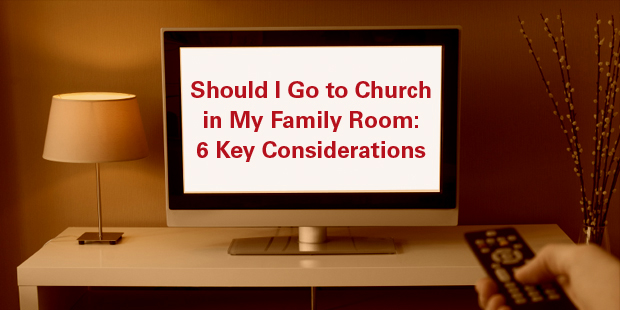
Should I Go to Church in My Family Room? 6 Key Considerations
A point of clarity is in order. In this article I am referring to “the digital church” in a very specific way. I am not referring to the many uses of the Internet available to churches: church web sites; social media; and a plethora of training tools. Instead I use the phrase to refer to those churches that view a significant part of their constituencies to be online rather than in person.
The “digital church attendees” likely view the worship services online. They may be in some type of online small group. They have the ability to minister to others via the Internet. And they can support the church financially online as well.
Some churches now view these persons as integral participants in the life of the church. A small but growing number are willing to grant them membership. And many churches see the digital church attendees as an extension of the ministry of the church, even if they do not have full membership status.
This phenomenon is not transitory. It will be with us for the foreseeable future. As I speak with pastors and other church leaders across America and beyond, here are the key issues being discussed.
- There is a lively debate regarding the status of the digital church attendees. What are the ecclesiological implications of the digital church attendees? Are they really a part of the church? Is physical presence necessary to be connected with a church? Should they be granted membership? Should they participate in communion/Lord’s supper?
- Many churches are using a “both/and” approach to the digital church. They have worship services and small groups where people gather and meet in person. But they also have an extension of their ministry that includes the digital church attendees. Some church leaders have shared with me the particular effectiveness for homebound persons and military persons deployed around the world. Only a small number of churches today are digital churches only.
- The digital church movement is growing. My information at this point is anecdotal, but I hope to have some good data from LifeWay Research in the future. Still, I have little doubt that the movement is growing and will continue to grow.
- Church leaders are struggling to find meaningful metrics for the digital church. Do such metrics as pageviews or unique visitors have any meaning for the effectiveness of the ministry? Do donations from digital attendees have any implications for the health of the ministry? What metrics are possible and also meaningful?
- Many digital church attendees are faithful financial givers to the church. I’ve been somewhat surprised to hear from church leaders about the financial support the church receives from the digital attendees. From my conversations, I’ve learned that the financial support is proportionate to the effort the church expends in connecting to digital attendees.
- The digital church is rapidly evolving. In a few months, much less a few years, we will know more about the digital church. For now, we know it is both growing and changing. This movement, for better or worse, may be one of the most significant in churches across the world for years to come.
I know that many church leaders will be looking to this particular article to get insights from others. Please take a few minutes to share with the readership any insights, experiences, or opinions you have about the digital church. You readers are incredibly bright. I look forward to hearing from you.
Read more from Thom here.

Tags: Digital Church, Thom Rainer, Worship, online worship












